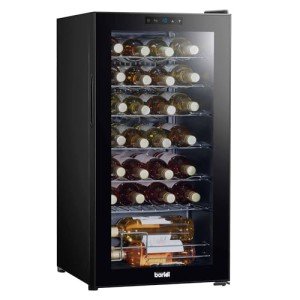10 Things You've Learned In Kindergarden That Will Aid You In Obtaining Wine Cooler

The Comprehensive Guide to Wine Coolers: Storing Your Vino Right
Wine, typically described as the "nectar of the gods," is more than simply a beverage; it embodies tradition, culture, and a refined palate. For aficionados and casual drinkers alike, the proper storage of wine is important to maintain its quality and taste. This is where a wine cooler enters into play.
What is a Wine Cooler?
A wine cooler, also understood as a wine fridge, is a specialized home appliance designed to save wine at consistent temperature levels and humidity levels, ensuring that the wine matures with dignity. Unlike conventional refrigerators, which can be too cold and dry for wine storage, wine coolers are tailored to the specific needs of various kinds of wine, consisting of reds, whites, and gleaming wines.
Secret Features of Wine Coolers
When thinking about a wine cooler, a number of functions enter into play:
| Feature | Description |
|---|---|
| Temperature level Control | The majority of systems enable you to set specific temperature levels tailored to the kind of wine. |
| Humidity Control | Keeps the ideal level of humidity to avoid cork drying and oxidation of the wine. |
| UV Protection | Numerous coolers have tinted glass that blocks UV rays which can ruin wines. |
| Vibration Reduction | Higher-end designs use compressor systems that reduce vibrations to avoid wine disturbance. |
| Capability Options | Whether you're a collector or a casual drinker, there are systems that can hold anywhere from 6 to numerous bottles. |
Types of Wine Coolers
When choosing a wine cooler, it is essential to comprehend the different types readily available in the market. Here is a categorized breakdown:
Freestanding Wine Coolers
- Description: As the name suggests, these systems are developed to stand alone.
- Pros: Many styles and cost savings in regards to expense; can fit well in kitchens, living spaces, or dining areas.
- Cons: They require adequate area and can be less energy-efficient.
Integrated Wine Coolers
- Description: These are created to be integrated into existing cabinets or kitchen space.
- Pros: Customizable, space-saving, and frequently more visually pleasing.
- Cons: More costly and may need professional installation.
Thermoelectric Wine Coolers
- Description: Using thermoelectric technology, these coolers do not have moving parts and rely on cooling components.
- Pros: Quieter operation and lower energy usage.
- Cons: Less effective in extreme temperature levels and preferable for short-term storage.
Compressor Wine Coolers
- Description: These run similarly to basic refrigerators with a cooling compressor.
- Pros: Reliable and maintain consistent temperatures; effective for long-lasting storage.
- Cons: Generate vibration and sound, which might affect wine quality.
Why Invest in a Wine Cooler?
Buying a wine cooler provides many advantages for any wine fan, including:
- Improved Taste and Quality: Proper storage conditions make sure that wine is kept at its best, affecting its taste and aroma positively.
- Longevity: Wine can be saved for several years, possibly increasing its worth if stored properly.
- Convenience: A devoted area for your wine collection supplies easy access and organization.
- Impress Guests: A stylish wine cooler can be a focal point in your house and impress going to family and friends.
Care and Maintenance of Wine Coolers
To lengthen the life and functionality of a wine cooler, routine maintenance is crucial. Here are some vital tips:
- Maintaining Temperature: Regularly check to ensure that the cooler is preserving the desired temperature level.
- Cleaning up: Wipe down the interior and outside of the cooler with a non-abrasive cleaner and soft cloth.
- Examine Seal: Regularly examine the door seals for cracks or damage to guarantee correct insulation.
- Humidity Levels: Use a hygrometer to keep track of humidity levels; ideally, they need to be around 60-70%.
- Positioning: Avoid exposing the cooler to direct sunshine or placing it near heat sources, which can affect temperature level guideline.
Frequently Asked Questions About Wine Coolers
1. What is the perfect temperature variety for storing wine?The perfect
temperature level for storing red wine is between 55 ° F to 65 ° F, while white wine needs to be saved at a cooler temperature, around 45 ° F to 55 ° F. Sparkling wines usually carry out best at around 40 ° F to 50 ° F. 2. How much wine can a cooler hold?Wine coolers been available in various capacities, from small units that can hold as few as 6 bottles to larger designs capable of keeping 300 bottles or more. 3. Do wine coolers utilize a lot of energy?Generally, sneak a peek here are developed to be energy-efficient, specifically thermoelectric models. However, energy intake may vary based on the brand name and model. 4. Can I save other beverages in a wine cooler?Most wine coolers are developed specifically for wine. Nevertheless, in many cases, it can be
suitable to save other drinks, such as sparkling water or soft beverages, as long as they do not disrupt the wine. 5. Is it necessary to keep wine in a cooler if I consume it regularly?Not necessarily. If you frequently consume your wine and do not prepare to save it long-term, a wine cooler is less important than for
someone who keeps white wines for aging. In conclusion, a wine cooler is a vital financial investment for anybody serious about their wine collection. By comprehending types, features, and maintenance tips, wine lovers can improve their experience with every bottle opened.
Correctly saved wine not just maintains the integrity of the wine however also adds a touch of sophistication and convenience to the enjoyment of this classic beverage. Whether selecting your very first wine cooler or upgrading to a high-capacity model, this guide offers the clearness needed to make the very best choice. Cheers to a well-stored bottle of wine!

